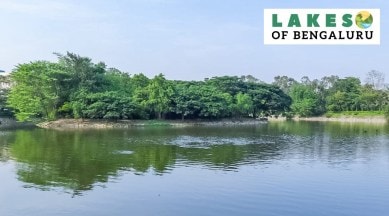Stay updated with the latest - Click here to follow us on Instagram
Lakes of Bengaluru: Concern over untreated sewage as Challakere lake reports fish deaths
The Karnataka State Pollution Control Board collects water samples from a hundred lakes in Bengaluru every month but ‘safely keeps it in their cupboards’, a resident alleged

With a spate of deaths of fish in lakes owing to the entry of sewage, concern is rising among Bengaluru over the authorities’ inaction to curb pollution. While taking a stroll around Challakere lake, residents recently noted 50 dead fish accumulated at one corner of the lake spread over more than 33 acres.
The lake is connected to the Ramapura lake in the downstream and eventually to Yellamallapa Chetty lake.
monthly limit of free stories.
with an Express account.
According to Bruhat Bengaluru Mahanagara Palike (BBMP), more than 11 acres of the lake have been encroached on by government and private bodies for a road, police station, graveyard and school playground, among other things.
A nearby resident, Haribhaskaran, said, “We counted 50 dead fish floating in the lake on Monday. While the greenery around the lake is very well maintained, the issue here is the poor water quality. We have even noticed garbage floating in the water. There is a fundamental problem with respect to the management of sewage and garbage. It needs to be fixed in a comprehensive manner.”
Haribhaskaran said the authorities had removed dead fish from the lake. “We have seen people fishing. The lake is polluted and if these fish are being sold, it will become a major health hazard,” he said.
Raghavendra B Pachhapur, senior lead (projects) with the NGO ActionAid Association, finds it ironic that the city does not have a 100 per cent underground drainage network despite the Bangalore Water Supply and Sewerage Board (BWSSB) having existed for more than 60 years.
“We let our sewage into storm-water drains. Entry of sewage into the lake is the first point where we need to be vigilant and act. In spite of an appointed lake official, a home guard and a maintenance contract, we are not able to monitor the entry of sewage during the dry season,” he said. “Officials’ lackadaisical approach towards complaints makes the lake more vulnerable to pollution.”
Pachhapur added that residents did not know whom to approach within the BWSSB to raise a complaint.“The lack of a complaint redressal mechanism within the BWSSB is one of the major challenges for residents. The 1916 helpline is ineffective.
According to Pachhapur, the Karnataka State Pollution Control Board (KSPCB), which has a duty to prevent water pollution, collects water samples from a hundred lakes in Bengaluru every month “and safely keeps it in their cupboards”. “We haven’t seen them effectively working for lake conservation in Bengaluru. When a complaint is raised, a notice is issued to the department responsible for pollution stating how punishable the offence is,” he said.
He said that though the KSPCB classified lakes on the basis of water quality, it did not take steps to prevent pollution or communicate to the lakes’ custodians, which include the BBMP, forest department and the Bangalore Development Authority.
Pachhapur opined that the deaths of fish in the lakes indicated the lack of seriousness on the part of the authorities. “It is avoidable provided the BBMP, BWSSB and the KSPCB work together. We see lakes as a place only for leisure and fitness. We need to broaden our perspective towards lakes as a biodiversity-rich place, appreciate the flora and fauna within the lake ecology and contribute our bit in conserving it,” he said.
On Thursday, the Madiwala lake in BTM also reported mass deaths of fish.